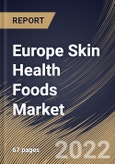The Europe Skin Health Foods Market is expected to witness market growth of 6.7% CAGR during the forecast period (2022-2028).
Chemicals that have a number of unfavorable side effects on the skin are frequently found in cosmetic products. As a result of this, a large number of consumers are shifting towards edibles that are chemical-free and do not have such side effects. The microbiome of the skin can be stabilized by using skincare products containing probiotics, which have numerous advantages.
One of these advantages is that the skin will have increased resistance to environmental effects. That might be a result of wind, sun, or air pollution damage. The texture and clarity of the skin can be negatively impacted by any of these environmental factors. This arises the need for nutritional food products that may enhance skin health and help overcome these skin problems. Probiotics, which are bacteria, can also be helpful for skin that is prone to acne.
These characteristics also enable Italy in its efforts to create a significant market for skin health foods in the Europe region. Additionally, R&D accounts for a sizable portion of the annual revenue of skin care food product manufacturers based in Europe. Due to their numerous advantages, nutritional foods are considered an essential component of the diet. These are also known as "beautiful foods," which combines elements of cosmetics, meals that serve a purpose, and nutritional supplements.
The Germany market dominated the Europe Skin Health Foods Market by Country in 2021, and is expected to continue to be a dominant market till 2028; thereby, achieving a market value of $193.1 million by 2028. The UK market is anticipated to grow at a CAGR of 5.9% during (2022 - 2028). Additionally, The France market is expected to exhibit a CAGR of 7.5% during (2022 - 2028).
Based on Indication, the market is segmented into Skin Conditions, Anti-Aging, and Anti-Allergy. Based on countries, the market is segmented into Germany, UK, France, Russia, Spain, Italy, and Rest of Europe.
The market research report covers the analysis of key stake holders of the market. Key companies profiled in the report include BASF SE, Danone S.A. (Sofina Group), DuPont de Nemours, Inc., Nestle S.A., Cargill Corporation, Arla Foods, Inc., Glanbia PLC, Herbalife nutrition Ltd., Archer Daniels Midland Company, and Koninklijke DSM N.V.
Chemicals that have a number of unfavorable side effects on the skin are frequently found in cosmetic products. As a result of this, a large number of consumers are shifting towards edibles that are chemical-free and do not have such side effects. The microbiome of the skin can be stabilized by using skincare products containing probiotics, which have numerous advantages.
One of these advantages is that the skin will have increased resistance to environmental effects. That might be a result of wind, sun, or air pollution damage. The texture and clarity of the skin can be negatively impacted by any of these environmental factors. This arises the need for nutritional food products that may enhance skin health and help overcome these skin problems. Probiotics, which are bacteria, can also be helpful for skin that is prone to acne.
These characteristics also enable Italy in its efforts to create a significant market for skin health foods in the Europe region. Additionally, R&D accounts for a sizable portion of the annual revenue of skin care food product manufacturers based in Europe. Due to their numerous advantages, nutritional foods are considered an essential component of the diet. These are also known as "beautiful foods," which combines elements of cosmetics, meals that serve a purpose, and nutritional supplements.
The Germany market dominated the Europe Skin Health Foods Market by Country in 2021, and is expected to continue to be a dominant market till 2028; thereby, achieving a market value of $193.1 million by 2028. The UK market is anticipated to grow at a CAGR of 5.9% during (2022 - 2028). Additionally, The France market is expected to exhibit a CAGR of 7.5% during (2022 - 2028).
Based on Indication, the market is segmented into Skin Conditions, Anti-Aging, and Anti-Allergy. Based on countries, the market is segmented into Germany, UK, France, Russia, Spain, Italy, and Rest of Europe.
The market research report covers the analysis of key stake holders of the market. Key companies profiled in the report include BASF SE, Danone S.A. (Sofina Group), DuPont de Nemours, Inc., Nestle S.A., Cargill Corporation, Arla Foods, Inc., Glanbia PLC, Herbalife nutrition Ltd., Archer Daniels Midland Company, and Koninklijke DSM N.V.
Scope of the Study
Market Segments Covered in the Report:
By Indication- Skin Conditions
- Anti-Aging
- Anti-Allergy
- Germany
- UK
- France
- Russia
- Spain
- Italy
- Rest of Europe
Key Market Players
List of Companies Profiled in the Report:
- BASF SE
- Danone S.A. (Sofina Group)
- DuPont de Nemours, Inc.
- Nestle S.A.
- Cargill Corporation
- Arla Foods, Inc.
- Glanbia PLC
- Herbalife nutrition Ltd.
- Archer Daniels Midland Company
- Koninklijke DSM N.V.
Unique Offerings from the Publisher
- Exhaustive coverage
- The highest number of Market tables and figures
- Subscription-based model available
- Guaranteed best price
- Assured post sales research support with 10% customization free
Table of Contents
Chapter 1. Market Scope & Methodology
Chapter 2. Market Overview
Chapter 4. Europe Skin Health Foods Market by Indication
Chapter 5. Europe Skin Health Foods Market by Country
Chapter 6. Company Profiles
Companies Mentioned
- BASF SE
- Danone S.A. (Sofina Group)
- DuPont de Nemours, Inc.
- Nestle S.A.
- Cargill Corporation
- Arla Foods, Inc.
- Glanbia PLC
- Herbalife nutrition Ltd.
- Archer Daniels Midland Company
- Koninklijke DSM N.V.
Methodology

LOADING...








